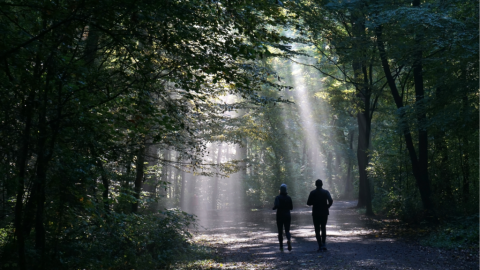I wonder as I wander

Recently, my friend and 13.8 writing colleague Adam Frank, wrote a moving essay on the joy of finding things out. Today, and in celebration of the nearing holidays, I will consider another joyful aspect of being a human being—the joy of wondering.
Wonder: The word itself is somewhat magical. As a verb, to wonder is to ponder, to muse on, to conjecture about. As a noun, wonder relates to awe, to fascination, to beauty. So, to wonder about wonders is to ponder about beauty, to muse about what fascinates us.
It is a privilege of being human—and one that we often take for granted—that we are curious creatures with a capacity for wonder. Anyone can tell of an experience when they’ve witnessed something magical, something that resonated with their core essence, however inexplicable or mysterious. It may happen when we behold the countless stars in the night sky, or when we feel small while standing under a huge peak, or the drama of hiking on a high cliff overlooking the crashing waves down below, or watching a mother nursing her baby, or witnessing an ephemeral double rainbow after a storm.
We are the species that sees but doesn’t only instinctively respond to what we see; we internalize it, engage with it emotionally, and try to find meaning in the moment. We experience life in a many-dimensional manifold that blends perception with a multicolored subjective response. And we love the way this richness of the now makes us feel, even if we have no clue how it all happens.
Behind our capacity for wonder lies a huge mystery. Why do we do it?
If you are a pragmatist, you must try to answer to what purpose we wonder. How does it serve us evolutionarily? To explore our surroundings has been essential to our survival. That’s obvious. Without over-sentimentalizing it, I don’t imagine our ancestors would always tour their surroundings in wonderment. The constant need for food and shelter, and the pressures of bad weather or encroaching enemies, were not so evocative.
But on the other hand, they didn’t react to their surroundings like a pack of wolves, roaming the fields in search of food without a deeper sense of appreciation for where they were. If cultures across the world and across time deemed certain places as being magical, they weren’t simply thinking of them in terms of their practical usefulness as a food source or shelter. There was an intangible quality to them, a quality that led to an inexplicable sense of attachment: This place is not like other places; here, we feel a sense of the transcendent, of deep connection. Here, we will erect a monument, a totem, a stone circle, a temple, so that we can come back over and over again and celebrate our mysterious attraction to it.
Many of us that enjoy being out in the woods, in the ocean, in the mountains, in nature, can relate. We may not call these places magical or relate to them in transcendent ways (although we could, and many do). But we do sense that they are different, that they have a message of some kind to tell us. The ancients would say that here is where the gods spoke; the temple was a marker for the sacred spot.
Beautiful and ominous
Last summer, I was running with my wife in a section of the Appalachian Trail near my home in Hanover, New Hampshire. There was no one in sight. After climbing a steep hill, we reached a solemn pine forest, one that seemed to have been there for centuries (probably not, though). The pine needles along the trail muffled our steps. Somehow, when we reached that part of the forest, we couldn’t hear a sound. The chickadees and woodpeckers stayed out; the wind stopped. As we moved deeper into the forest, the trees became denser and it grew darker. It was at once beautiful and ominous.
Suddenly, a beam of sunlight cracked open the clouds and descended through the high branches to illuminate a huge granite boulder. The dark green moss covering the stone glistened in a thousand sparkles. We stopped dead on our tracks and gasped at the simple beauty of the moment. “This is why so many ancient cultures deemed certain places as being magical,” said my wife. When life gives you such gifts, it is impossible not to feel a sense of reverence and gratitude. But such experiences are only privy to those open to receive them.
We have moved away from our natural roots and created a fake world of walls around us, walls that keep us away from one another and from the world out there. We have lost our sense of enchantment with Nature, the sense of awe our ancestors had when they experienced the world and deemed it sacred.
To nurture the joy of wonder is to be attuned to the simple beauty of the unexpected. It may reveal itself in the silence of an old dark forest, or in that strange uncomfortable warmth we feel when we witness something that defies rational explanation. As so many explorers, artists, and scientists know, there is endless wonder in flirting with the unknown.
The post I Wonder as I Wander appeared first on ORBITER.





